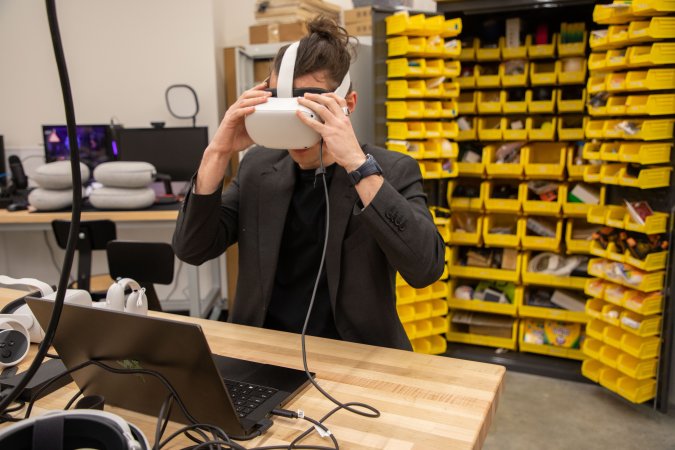New Cybersecurity Response Studio Wins $1.25M in Federal Funding

By Mike Nolan
ALBANY, N.Y. (March 19, 2024) — A new institutional cybersecurity initiative at the University at Albany is receiving a major boost in the 2024 federal budget.
U.S. Sens. Chuck Schumer and Kirsten Gillibrand announced last week that UAlbany will receive $1.25 million to purchase advanced technologies and support faculty involved with a new Cybersecurity Incident Response Studio (CREST). The initiative will bring cyber and crisis management researchers from across campus together to support training and simulation exercises for public, private and non-profit sector partners.
The CREST funding is part of nearly $13 million secured for Capital Region projects in the federal government’s FY2024 spending bill.
“The nearly $13 million I delivered means a brighter future for the City of Albany to finally redevelop the Lincoln Square property, and UAlbany to develop the next generation of cybersecurity professionals. Capital Region communities will get their shovels working to build key infrastructure, and will access new vital family services and so much more to ensure the vitality of the region for years to come,” Schumer said.
“Cyberattacks are increasing in frequency, complexity and severity in New York and worldwide,” added UAlbany Vice President for Research and Economic Development Thenkurussi “Kesh” Kesavadas. “CREST brings together AI and advanced immersive technologies to assimilate and process the ‘big data’ that needs to be analyzed to understand evolving cybersecurity vulnerabilities and build resilience. We are grateful for Sens. Schumer and Gillibrand’s continued strong support for protecting New York’s critical cyber infrastructure."
High-Tech Cyber Simulations
Once launched, CREST will support the security of local governments, non-profits and small businesses across New York by offering high-tech simulations of cyberattacks, giving decision-makers across the state opportunities to practice responding to the consequences of attacks and improve cyber-incident response skills in a safe environment.
The simulations will be offered in-person at UAlbany’s ETEC research and development complex, and remotely in the metaverse, a virtual-reality space in which users can interact with each other through a computer-generated environment.
Through the federal investment, CREST researchers, trainers and trainees will be supported by advanced technologies including high-performance computing, immersive visualization, and AI-enhanced sensemaking and decision-making.
This high-tech equipment will enable simulations in areas including:
- Cyberattacks and defensive interventions
- Impacts on computers, vital information systems, and the so-called Internet of Things (IoT)
- Cascading organizational, community, societal, and government consequences of cyberattacks
- Decision-making and communications associated with critical cyber incident response and recovery
In addition, CREST researchers will develop a user-friendly cyber response toolkit and monitor the rapidly evolving forms of best practices for organizational cybersecurity and cyber resilience.
“CREST is harnessing emerging technologies such as AI and virtual reality to create an immersive cyber incident response simulation experience,” said Eric Stern, interim director of UAlbany’s Institute for Artificial Intelligence and a professor at the College of Emergency Preparedness, Homeland Security and Cybersecurity (CEHC). “Our multi-disciplinary team will draw upon UAlbany’s capabilities from across campus to realistically simulate cyberattacks and develop innovative techniques for education, training and preparedness-building.”
A Leader in Cyber Defense
Along with its researchers, CREST will leverage UAlbany’s unique cybersecurity resources, including several spaces at CEHC:
- The CEHC Cyber Range, a 20-seat laboratory that will allow for virtual simulation of integrated networks, systems, tools and applications
- The Cyber Resilient Interdependent Infrastructure Systems Laboratory, equipped with the infrastructure to build cyber resilient information systems and secure critical infrastructure that rely on cyber-physical systems
- The Hack-IoT Laboratory, a venue for investigating and assessing IoT hardware, software and the nexus between them
- The Center for Advanced Red Teaming, the first academic center devoted to advancing the art and science of red teaming, a tactic used to understand adversarial behavior and test security processes in a wide range of industries
CREST will also leverage researchers and infrastructure available through UAlbany’s Center for Technology in Government, the College of Nanotechnology, Science, and Engineering, and the Massry School of Business, including its Forensics, Analytics, Complexity, Energy and Transportation Security Center.
Researchers plan to work closely with state government including the NY Joint Security Operations Center and recruit UAlbany undergraduate and graduate student assistants to support the effort.





